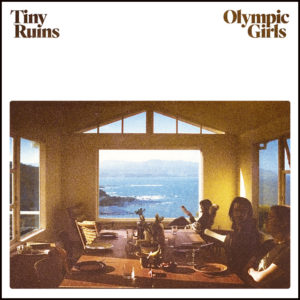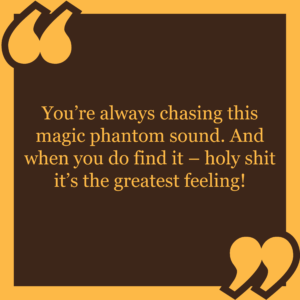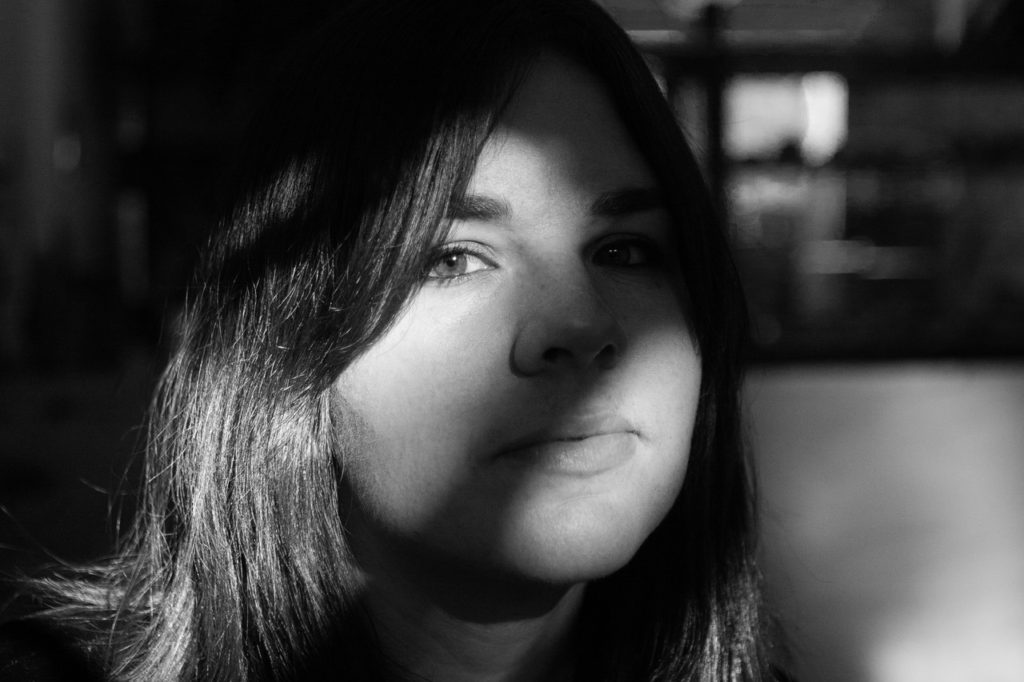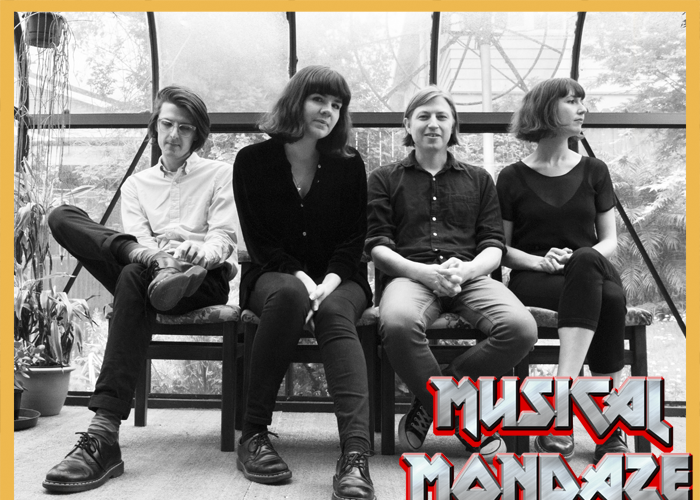
The latest Tiny Ruins album, “Olympic Girls” (set to drop this Friday from Ba Da Bing), is bigger and bolder according to Hollie Fullbrook, pack leader of the New Zealand-based quartet. Originally intended as a solo project, much of the critical praise following their previous recordings, including 2014’s “Brightly Painted One,” was deservedly heaped on the singer/songwriter, though she is quick to point out the band’s creative and personal significance.
“The band motivates me, encourages me, cajoles me, teaches me, keeps me sane, keeps me active, makes me laugh, gives me a sense of camaraderie,” she told TrunkSpace in a recent interview. “My bandmates are hugely important to me, and they really made the record what it is.”
In other words, they are all Tiny Ruins.
We recently sat down with Fullbrook to discuss the roller coaster ride in bringing “Olympic Girls” to life, wrangling herself in and out of songs, and why she aspires to tell stories with her songwriting.
TrunkSpace: We’re just a few days away from the release of your latest album “Olympic Girls.” As you gear up to share new music with the masses, what emotions do you juggle with? Does it vary album to album?
Fullbrook: Mainly a sense of lightness, like a weight is lifting from my shoulders. Release is definitely the right word. We’ve been holding on to these songs for a while now. I feel some apprehension, nervous energy too… focusing on what we need to do to tour this thing over the coming months.
It’s an understatement to say this one’s been a roller coaster ride. With this one, I’m acutely aware of all the things that have aligned and all the people who have helped myself and the band get to this point. It feels great to be finally sharing it.
TrunkSpace: This is the third album by Tiny Ruins. No one is closer to the music than you. As you listen back to the earliest creative iterations of the band and compare it to what is on “Olympic Girls,” where do you hear the biggest differences? Were those changes by design or a natural progression?
Fullbrook: The band fully came into its own on this album. In that all our personalities are expressed more in the music. It has a more extreme palette of sonics, is bigger and bolder… both a natural progression and conscious decision. We discussed using broader strokes, more electric guitars, heavier drums – the songs really called out for those things, and I wrote with the full band in mind. But I also wanted to stay true to where we’d come from. I didn’t want it to be a departure into something we’re not. It was about being more ourselves than about a reinvention.
conscious decision. We discussed using broader strokes, more electric guitars, heavier drums – the songs really called out for those things, and I wrote with the full band in mind. But I also wanted to stay true to where we’d come from. I didn’t want it to be a departure into something we’re not. It was about being more ourselves than about a reinvention.
I do hear some difference in my vocal delivery. I pushed outwards in my singing and guitar playing on this album, tried to get better at both, and in many ways both the lyrics and delivery are the most ‘me’ they’ve ever been. I’m older, my voice feels deeper, stronger – all that stuff. And maybe I’ve dropped my guard down a bit further.
TrunkSpace: The album was recorded over the course of a year. Did that allow for time to
tinker and perfect the tracks in ways that you didn’t have the luxury of doing with your previous studio recordings?
Fullbrook: We recorded it in the same space as last time… in our practice space, actually, at (electric guitar player) Tom Healy’s studio at The Lab – an underground warren of small independent recording rooms. Tom’s a music producer by trade; he recorded and mixed this one and the last album too. With “Brightly Painted One” we blocked out two weeks and tracked everything quickly. We used a big studio room at The Lab for some songs, so there was more of a feeling of time pressure. We were greener – Tom’s kit set room was newly put together. I was in the throes of heartbreak, absolute heartbreak, so recording those songs was painful, but compounded in time.
Tom has since joined the band. This time ‘round, and with all of us juggling other jobs, touring, life’s ups and downs, these recording sessions were spaced out weeks apart. I was writing songs throughout. We didn’t start out with the full track list ready and waiting – it was a sort of gradual workshopping process that felt very relaxed and methodical. For me personally, the recording sessions were little islands of joy, with my friends, when I got to make music and pour all this energy out. The sessions weren’t painful, they were the thing I looked forward to most.
We’d record in these beautiful little capsules of time, perhaps on a weekend or a public holiday, or a day that everyone was free… and things took a while for us to build. And it was like sole dedication to each song over the course of maybe two or three days, recording every part, and then we’d leave it and move on to the next song two or three weeks later. We didn’t listen to what we’d done until fairly far along – maybe five songs deep. I didn’t get weighed down with the details of it all. It felt like we worked very seamlessly, easily, on this record. It just took time to get there.
TrunkSpace: We found that you can’t just listen to “Olympic Girls” – you feel it as well, which is not something that many artists can achieve. The emotions weaved into the various tracks are multilayered, which makes each song a journey. Was that something you set out to achieve in the studio – to prompt empathetic response from the listener?
Fullbrook: I wouldn’t say that’s something we were thinking about. You have to be careful about manipulating emotion for an audience’s sake, both with recording or performing, as it can really backfire.
When I’m recording I’m not thinking about how a listener might respond. I’m just responding, and choosing. Thousands of decisions based on our immediate responses. We always choose the take that personally makes us feel something. There might be imperfections in a take, but something about it just has the feeling. It’s strange that you can sing the same song a bunch of times, but one of those times, it clinches it. It affects you differently. Cass’s bass line goes somewhere weird which she just can’t replicate or make any better. Or Alex’s drum fill that makes you surge with adrenaline. You’re always chasing this magic phantom sound. And when you do find it – holy shit it’s the greatest feeling! So it’s just our own gut instincts we’re always checking in with. And then hopefully, that translates somehow, to the listeners, in the end.

TrunkSpace: What are you most proud of with “Olympic Girls” as you prepare to share it with listeners?
Fullbrook: Some of my favorite songs on the album are ones that have not been released as singles. A track called “Sparklers” is one that I’m pretty proud of. And the second half of the album is kind of wild. Tom went next level on the mixing, getting all these big expansive soundscapes to really open up, and I think for listeners who’ve been waiting for the next Tiny Ruins, it’s going to be really exciting for them, listening in the dark with headphones or whatever. I love imagining that. Of them hearing the songs they don’t know yet.
TrunkSpace: As a songwriter – someone who is expressing themselves through their art in various ways – do you ever second-guess yourself as to if you’re putting too much of yourself into a lyric or overall performance, and in the process, leaving yourself too exposed?
Fullbrook: Hmm, maybe yes, occasionally. Some writing is too raw, and it doesn’t actually get across what you want to say in a coherent way. Not that everything always needs to be coherent. (Laughter) But…I guess you can splurge a whole lot of writing when you’re in a distressed or exuberant state, and when you come back to it a day or so later, it feels overwrought, or full of pretense, or it’s just way too general. So it’s about channeling the truth of that experience or emotion in a way that still feels like you’re honoring it, but honing it into something that has more a life of its own, more specificity. I feel exposed with every song I’ve ever written – when I play one to the band, for instance, for the first time, it’s excruciating. I feel so nervous giving songs their live debut… it’s always going to feel intensely personal – that’s the nature of the beast. But in terms of the craft of writing, yes, I do try and wrangle myself in and out of songs sometimes.
TrunkSpace: A novelist will take thousands of words – hundreds of pages – in an attempt to perfect a beginning, middle and end of a story. Meanwhile, a songwriter does the same thing in just a few lines. When done right, it’s magic. Do you see yourself as a storyteller, and if so, what is the greatest story you’ve ever told?
Fullbrook: I have always loved being read to, and I love reading stories aloud. I have worked as a nanny at certain points of my life, and I enjoy kids, because they drink up stories. For me, there aren’t many songs that can really compete with a powerful story told to an enraptured audience. I was a lucky kid that got told many stories by various adults in my life. Stories are so important to us humans that they were made into songs, to make them even more memorable.
I think I do aspire to tell stories; certainly it’s an important part of how I make sense of a song to myself.
TrunkSpace: What do you get writing and performing within a band, and this band in particular, that you can’t access from a solo mindset? What are the benefits for you personally in having a group of people fighting the fight alongside of you?
Fullbrook: This is such a good question and doesn’t get asked enough. My band mean everything to me. They’ve basically been there with me from the beginning – we could just never afford to tour as a full band in the early days. We are all old friends now, and have been playing music together for eight or so years.
I’m the leader of the pack, but it’s a pack. My writing is a solo activity and something I do alone, but getting those songs to their best version – that’s as a group, and we all listen to each other, it’s pretty democratic. I trust them. They are all incredible musicians. They all come up with their own parts. The band motivates me, encourages me, cajoles me, teaches me, keeps me sane, keeps me active, makes me laugh, gives me a sense of camaraderie. Music would not be nearly as fun without Cass, Alex and Tom. It’s not easy making a band sustainable, especially when you’re based in New Zealand. So we’ve had to be flexible. I’ve toured a lot solo. I’ve collaborated with others. We manage ourselves. We tour manage ourselves. My bandmates are hugely important to me, and they really made the record what it is.

TrunkSpace: Can you envision a day when music is not a part of your life?
Fullbrook: No.
TrunkSpace: Outside of another artist, was there someone in your life who inspired or supported your creative endeavors that you feel was important to you getting where you are today with your music?
Fullbrook: Early on it was a couple of friends who encouraged me to do an open mic night and record some demos. Aaron Curnow at Spunk Records really believed in me and got my career going. Then my band came along. Simon Raymonde at Bella Union also instilled a lot of confidence in me. And now the great people at Milk! Records, Ba Da Bing Records and Marathon Artists. A solid team is really vital.
I owe a lot of my tenacity and strength to my parents. They raised us with humor, openness, emotions all out there, quite chaotic. Our childhoods were pretty free and idyllic. They’ve always really had my back, always listened and given support. They’re pretty amazing.
My partner of several years. He’s not musical, and knows me completely separately to my ‘career’. From the sidelines he’s the voice of reason and of love I often need to hear. He goes to every show he can, has tour managed us in the past across the US, and often sells our merch. He’s an absolute champion, not of my career, necessarily, but of me. He refuses to offer feedback on songs or a performance. Which can be frustrating. But in the long run I appreciate that. He doesn’t prop me up in any way. He has made me a much stronger person. It means I only listen to myself and my band, I don’t go seeking approval from anyone.
TrunkSpace: Time machine question. If you could jump ahead 10 years and get a glimpse of what your musical journey looks like a decade from now, would you take that journey? If not, why?
Fullbrook: No… that idea just doesn’t appeal to me at all.
“Olympic Girls” is available Friday from Ba Da Bing.


